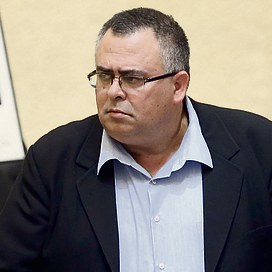

MK Glick: Netanyahu won't meet with me, Bitan ignores me
MK Yehuda Glick, who filed an unprecedented High Court petition against the prime minister’s refusal to allow lawmakers to visit the Temple Mount, is not afraid of the price he is paying in his own party. While all his proposed bills are being thwarted by the coalition chairman, he is busy strengthening ties between Jews and Muslims while at the same time supporting the annexation of Judea and Samaria.
He fights for the Temple Mount, but he is a man of peace. He is a hot-tempered redhead, but he believes in dialogue. He hates disputes, but he can’t remain silent in the face of injustice. He has a remarkably cynical sense of humor, but he is dead serious and speaks with almost prophetic passion. He is a member of the Likud, but is not afraid to confront senior party members and even vote with the opposition.
We accompanied MK Yehuda Glick for a day as the Israeli parliament wrapped up its winter session to understand how he skips between extremes and brings opposites together. It wasn’t easy chasing such a hyperactive person down the Knesset’s corridors, between meetings and discussions, especially in the midst of his war of attrition against the strongest man in the coalition, MK David Bitan.
The war, which has been going on behind the scenes for a long time, was made public early last week in a post Glick wrote on his Facebook page. Before heading for battle, he qualified that his comments were constructive criticism from a lawmaker who “has had enough” and was speaking out of pain, love and admiration for the government and its leader.

Glick wrote in his post that when he was recently invited to a social coalition event, he expected to hear words of gratitude to the many people who have been working night and day to help the MKs. He was very disappointed, however, by the fact that the entire evening was “a display of admiration to one man, the man who organized the event for himself. One by one, different speakers got on the stage, carrying a single message: ‘We have been blessed by Heaven to have a person with real divine powers. A man who is as sweet as honey and completely perfect. A diligent and gentle person who easily got through the entire Knesset winter session.’
“If that’s what everyone thought, so be it. But, God Almighty, so much hypocrisy,” Glick added in his post. “We are talking about a coalition chairman who has managed to get into quarrels with so many of his coalition members. We are talking about a man who causes all of us to put on a bullet-proof vest every Saturday evening, because who knows what he said this time that we’ll have to explain. How many times have I heard people say, ‘We have never had such an aggressive coalition chairman’? I could go on, but I really have no interest in doing that.”
Nevertheless, Glick keeps criticizing the way the coalition, which he is part of, is being run.
Shouldn’t such criticism be made in person? Why take it all out on Facebook?
“Do you have any idea how long I’ve been trying to meet with the prime minister? Ten months. I’ve turned to him both in writing and in person. I’ve met with all his associates. Netanyahu won’t give me even five minutes. With Bitan himself it’s impossible to talk. I make sure to keep saying hello to him, although he ignores me.
“I had no other way. This isn’t personal criticism against Bitan. It’s a matter of principle. I believe that we must create in the Knesset a pleasant and respectable work environment. Turning a social coalition event into an event worshipping one man is terrible. Bitan is a good person and he has good goals, but I don’t believe in aggressive conduct and in threats. The way I see it, machoistic behavior points to weakness, not to strength.”
‘Disregard for Knesset members’
Glick personally experienced the aggressive behavior he is talking about. He says that when he dared oppose the “Muezzin Bill,” which limits the use of loudspeakers in the Muslim call for prayer, Bitan approached him at the Knesset and told him—in front of other astonished MKs—that if he did not vote as he was ordered to, Bitan would make sure that NIS 65 million that were allotted to Judea and Samaria would not be transferred.
That was not the first friction between the two. According to Glick, in the previous times he took a personal stand—like criticizing IDF soldier Elor Azaria, who was convicted of manslaughter for shooting a neutralized terrorist to death, or the prime minister’s lengthy response to an investigative report on journalist Ilana Dayan’s television show—Bitan said he would make sure it would be his last term in the Knesset. Another thing Bitan is likely unhappy with is Glick’s support for awarding the Israel Prize to artist Yair Garbuz. Bitan, the strict master sergeant, is incapable of containing rebellious and independent soldiers like Glick.
Bitan is not making empty threats: He has been stonewalling every bill proposed by Glick for a long time now. “Every time, before a bill of mine was brought to the Ministerial Committee for Legislation for discussion, I spoke to all the ministers, who promised to vote for it. The next day, the bill wasn’t approved. I asked what had happened, and they explained that Bitan had told the ministers to vote against it. When I asked Bitan why he had instructed them to do so, he said to me: ‘Because it’s a stupid bill.’ Just like that, without any arguments, without discussing it with me.
“The coalition chairman has a scornful, insulting and offensive way of talking. The faction is being run without any debates. We are told what to think on all the issues on the agenda. We are dictated what to vote. No one has any regard for the Knesset members. The biggest party’s MKs are disciplined soldiers. No one cares about their opinions, and if they don’t stand at attention and salute—they are punished. I run into so many frustrated MKs in the Knesset’s corridors. Bitan has managed to get into quarrels with so many Likud MKs: Miki Zohar, Sharren Haskel, Nava Boker, Yoav Kisch, and more. These frictions and frustrations are the coals that could set fire to the coalition and lead to its collapse, against our will.”
After this kind of criticism, you have a very small chance of succeeding in the next primary elections in the Likud. Doesn’t it bother you?
“No. I had no plans on having a political career. On the contrary, I promised my wife that there was no chance I would be elected to the Knesset. The polls predicted 22 Knesset seats for the Likud, and I was in the 33rd slot on the list. What’s the conclusion? Don’t believe polls and don’t believe men. I live in the present. I am making the most of this term. There are Knesset members who are constantly worried about whether they will be reelected, and that affects their actions in the present. I’m not like that. I don’t run from a bar mitzvah to a bris either. I believe that, at the end of the day, members of the Likud Central Committee appreciate me for who I am. And if they don't, I have a lot to do outside the Knesset.”
Thanks to Bitan, since Glick was sworn in as MK 10 months ago, only one of his bills has passed a preliminary reading: A proposal for an epinephrine autoinjector in every school. In light of the situation, he has decided to focus on creating lobbies in the Knesset.
He established the Lobby to Strengthen the Relations between Jews and Muslims and co-chairs it with MK Zouheir Bahloul (Zionist Union). The two led the opposition to the “Muezzin Bill” together. He calls his office “Jerusalem of Peace,” and this slogan adorns his official stationary, his business card and the office’s door.
A significant part of Glick’s time is devoted to meetings with Muslims and Christians. He recently hosted in his office two Muslim activists from Turkey, a doctor and a media personality. The two visited Glick in order to present him with a computerized model of the Temple they created. They imagine the Temple being built next to the Al-Aqsa Mosque, out of an understanding that the Temple Mount should be a house of prayer for all religions.
Glick is moved by the gesture, but snaps back to reality. “We are not at a stage in which something practical can be done,” he clarifies to the guests. “The goal is to make people understand. Just like the State of Israel was established by the United Nations, the Temple should be built at the consent of the world’s nations.”
Glick leans back on his recliner chair and closes his eyes. He is incapable of sitting up straight for long. His house in the settlement of Otniel is also filled with special chairs for him. The excruciating back pains he suffers from are the result of the assassination attempt he survived in October 2014. “But why have three separate houses of prayer?” he straightens up and opens his eyes in front of the slightly embarrassed Turks. “We need one house of prayer in which the believers of all religions will pray.”
‘Sara Netanyahu is a cordial woman’
In the meantime, until the Turkish vision is realized, Jews are not permitted to pray on the Temple Mount, and Glick himself can’t even visit the Mount. The person who is preventing MKs’ access to the site is the prime minister. For 10 months, Glick has been trying to understand the meaning of the prohibition. He met with the attorney general and with the Knesset’s legal advisor and even invited police representatives to a discussion at the Knesset. They all pointed at one person who is insisting on banning MKs entry to the holy site.
Recently, Glick and MK Shuli Moalem-Refaeli (Bayit Yehudi) established the Lobby for Strengthening the Jewish Connection to the Temple Mount. “I view the Temple Mount as a very important issue,” he says. “For a long time now, Knesset members have been illegally barred from entering the Mount. This contradicts the basic laws of freedom of movement and freedom of worship. It contradicts the immunity law and the Protection of Holy Places Law. All legal advisors and the heads of the police say that I am right. The prime minister is refusing to meet with me, so in November I relayed a message to him that I would be forced to petition the High Court of Justice against him.”
The message did not change Netanyahu’s stance. One of the prime minister’s associates hinted that Glick would actually be helping Netanyahu by turning to the High Court. After all, is there anything that serves Netanyahu better than removing the responsibility from his shoulders and rolling it over to the High Court? Why should he be accused of setting the Middle East on fire when there are judges in Jerusalem?
Glick’s move would be the first time in which a Likud MK petitions the court against a prime minister from his own party. “I have no choice,” he says. “This discrimination is intolerable. I would very much have liked to submit the petition together with Arab MKs, but unfortunately, they won’t cooperate with me on the Temple Mount. All the legal advisors tell me chances are very high that the court will accept my petition. A prime minister cannot give the police an illegal order.”
What do you think about Netanyahu’s conduct—deciding to open and to close the Israel Public Broadcasting Corporation (IPBC) based on his whims?
“The Israel Broadcasting Authority and the workers’ high salaries reached levels that required an intervention. Long and profound discussions were held. The prime minister made a decision, which wasn’t easy, to embark on a new path. He must stick to this move undauntedly and, as importantly, sensitively. The highest price is being paid by employees who have worked devotedly for many years and are now being forced to go home. We must be attentive to their distress. This applies to the IPBC workers as well, whose future is unclear.”
Is it a healthy situation for politicians to intervene in public media?
“The press must be free. In a country like ours, there is an interest in ensuring that we have a public channel that offers the wonderful variety of the Israeli society, while reflecting the patriotic feelings of the Return to Zion after 2,000 years. Politicians’ desire to influence the nature of the broadcasting and to protect the public interest is understandable, and it’s not illegitimate just like the desire of other elements to influence is not illegitimate, as long as we maintain a balance and offer a maximum variety of voices.”
Netanyahu says the IPBC has been taken over by leftists. Do you agree with that? Is the press leftist?
“I don’t know all the IPBC journalists. Being leftist is not a crime. Every person comes with a set of values and world views. The public channel must not be painted in one color. I do expect every journalist to be professional and credible and not to let anyone off easy. My impression is not that this is a leftist channel. Kalman Liebskind is in my opinion an example of a professional journalist, although he comes with a world view—but it's not leftist.
“Netanyahu’s claims that the media have been unfair to him are not groundless. Over the years, he and his family have not always been treated fairly. I would just like to note that I didn’t know Sara Netanyahu personally. The image I had of her (from the media) was of some kind of a monster. But when she arrived as guest at the Lobby for Encouraging the Study of the Bible, which I chair, I discovered a very cordial woman who moved all the participants with her stories about the home she grew up in.”
Was it right to threaten to dissolve the government over the IPBC?
“Rocking the country with an election campaign is wrong. We've had enough of allegedly-public broadcasting representing the minority’s stand. On the other hand, Netanyahu is the person who decided to open the IPBC, and at this point it’s wrong to turn back the clock.”
In any event, who do you think will be the next prime minister?
“I don’t agree with those who are already eulogizing Netanyahu. He will lead the state for many years to come. Even if there is criticism against him here and there, this government is generally doing an excellent job both in terms of foreign policy and domestic policy, and there is no better prime minister around.”
It seems that the Right isn’t really governing and is failing to advance its vision. How is it possible that under Netanyahu, Amona was evacuated and houses were demolished in Ofra ?
“That’s a tough question. The day Amona was evacuated, I was seriously disappointed. I am very disappointed that we have yet to see a significant construction momentum in Judea and Samaria. The population there is growing, but not at the pace that we would like it to. It’s wrong, however, to say that the Right is not governing. There would have been no growth in Judea and Samaria under a left-wing government. I believe that we must annex all of Judea and Samaria. Unfortunately, the Right doesn’t have the courage to do so, for now.”
Fighting prostitution
As the Knesset’s winter session comes to a close, Glick also points to his own failures and disappointments. His failures, as far as he is concerned, include comments on issues he had insufficient knowledge of, as well as interrupting fellow lawmakers.
“But in general, as a person who has been in the Knesset for less than a year, I look back with satisfaction at the variety of issues I was involved in,” he says. “I worked in lobbies encouraging Bible studies and strengthening the connection to the Temple Mount. I raised public awareness to issues like post-natal depression and the distress of divorced men, and I fought against things like smoking and prostitution. I plan to continue my work until prostitution clients are convicted and smoking is dramatically reduced.”
The center of gravity of Glick’s activity in the Knesset, however, focuses on pushing for a change in the internal Israeli discourse, in creating a model of a right-wing ideologist who also supports human rights and pursues peace.
“It was difficult seeing the polarization between Jews and Arabs and among Jews during this term,” he says. “Unfortunately, even the moderate members of the Joint List have adopted radical Palestinian views, while at the same time quite a few Jewish Knesset members are ‘earning a living’ from fanning the flames instead of aiming to strengthen our life together.
“There are many ethical members of Knesset as well. I have a lot of appreciation for the thorough work of the two chairs of the committees I am active in: Yakov Margi (Shas) in the Education Committee and Tamar Zandberg (Meretz) in the Special Committee on Drug and Alcohol Abuse. I have met new friends who I appreciate outside the party, like Merav Ben Ari (Kulanu), Haim Jelin (Yesh Atid) and Ayelet Nahmias-Verbin (Zionist Union), and inside the party, like Amir Ohana and Sharren Haskel.
“There are also Knesset members, however, who are not proposing laws but are rather proposing declarations. Oren Hazan tried to convince me to support the ‘Muezzin Bill.’ He told me that the government planned to stonewall the bill before its last reading, so why don’t I just vote for it. I agree that the muezzin noise should be dealt with, but it should be done through dialogue rather than in a populist manner.
“I see lawmakers who finish addressing the plenum, go outside and say: ‘Did you see how I let him have it?’ In my eyes, the goal is not to let someone have it. On the contrary. Zandberg told me she came to the Knesset to promote discourse, not create it. My goal is the complete opposite. I came to the Knesset to advance a respectable dialogue.”
Bitan: Glick is defying and harming Likud
Coalition Chairman David Bitan said in response to Glick’s comments about him: “Yehuda Glick was elected to the Knesset on behalf of the Likud, yet he acts against the coalition and the faction, while defying and undermining them. The results of my work prove the opposite of his claims. As coalition chairman, I have led compromises through team work, made decisions and passed hundreds of bills, including the Arrangements Law and the State Budget. If Glick had put as much effort into team work for the sake of the movement he represents in the Knesset as the effort he puts into pleasing the media, I am certain he could have been an efficient MK. I have no intention of showing any empathy towards someone who votes against Likud and the coalition.”

















